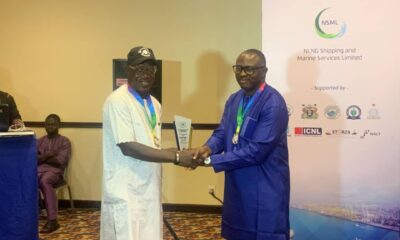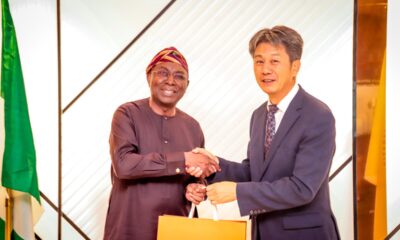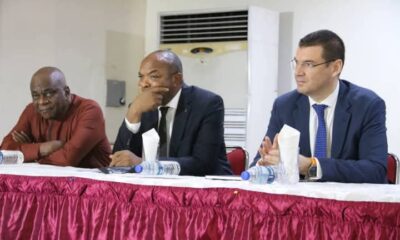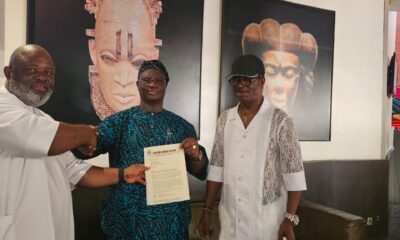Maritime
Minimum Wage: How Maritime Union Ditched National (1)
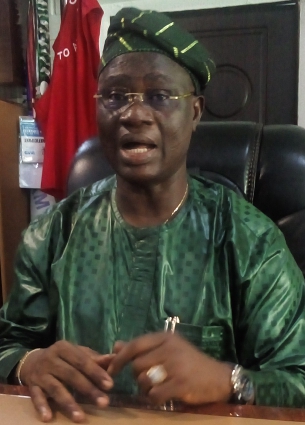
SILHOUTTE
BY GBOGBOWA GBOWA
It must be acknowledged and timely too that the maritime industry and its employment structure and hence the maritime workers by the nature of their work and condition of service are both unique and peculiar, in the light of dissimilarity that exists in uniform labour movement dynamics.
The peculiarity stems from the fact that the maritime industry parades the largest and yet dissimilar employment portfolio that comprise of the organized private sector (OPS) and the civil service; creating a sort of slight distortion in the labour movement governance system.
But this is as far as it goes when considering labour movement actions such as wage structure and condition of service template, wage negotiations and reviews, plus associated organizational responsibilities and tasks, including disputes of varying nature and resolutions.
Having made that necessary clarification, let us return to the subject matter being the ongoing minimum wage discussion between government and the Nigerian Labour Movement (NLC), by reason of its protracted and seemingly endless conflict.
This is especially so in view of the planned protest by NLC scheduled for tomorrow, December 1, 2024 aimed at insisting on the full implementation of the agreed minimum wage of N70,000, agreed upon recently between government the NLC.
As an affiliate of the NLC, the Maritime Workers Union of Nigeria (MWUN) enjoys a special status and recognition by virtue of its sheer size in the nation’s labour space, in addition to the criticality and sensitive nature of its service in the national economy and socio-political work place; be it public or private.
It is so sensitive and central to the political and industrial stability of the country that its leadership, both current and immediate past within the last twelve years worked very hard to create a unique sense of responsible unionism that thrives on the principles of fair bargain and avoid the repeat of the dark past era that destabilizes national productivity and industrial harmony through reckless and often time, irresponsible industrial strike actions.

Nigeria has the current and immediate past leadership, talking about Dr. Adewale Adeyanju and Comrade Tony Nted, to thank. Both leaders took the maritime workforce through the baptismal fire of responsible unionism vide intellectual sensitization and reorientation that prioritizes dialogue and engagement over and above the primitive convention of haste and destabilization of productivity.
If Michael Imodu and Adams Oshiohmole are considered great labour leaders, Adeyanju and Nted cannot be less. In fact, both gentlemen represent the father of modern day labour movement and should be so recognized. They are living legends and deserving of national awards for their bold and committed contributions to industrial peace and harmony.
Talking about reward, it stands to reason that the incumbent President General of MWUN, Dr. Adewale Adeyanju got elected as NLC Deputy President in 2023, barely a year before the agitation for wage review in the light of the devaluation of the naira and the galloping inflation that followed; driven largely by President Ahmed Tinubu’s controversial fiscal and economic policies.
But after the euphoria of his election and the expectation that he will impact workers positively, his later actions which some have described as divisive and double dealing, has already put labour movement in a difficult position, arising from feelings of sadness and distrust, and dissatisfaction among Nigerian workers.
Barely ten weeks after the NLC with Comrade Adeyanju as deputy president signed a minimum wage of N70,000 for workers, he proceeded to his industry to press for a minimum wage of N200, 000 under the shipping condition of service template. His struggle singularly led to industry negotiated a minimum wage of N200,000 for maritime workers.
Since the signing of the N200, 000 minimum wage, Adeyanju has grown larger than life, with maritime workers singing his praises as the Napoleon Bonaparte of Nigerian workers.
And just on account of that, the other industry workers are said to be unhappy with the leadership of their respective unions who they regards as incompetent, even as some workers are said to have alleged a sellout of sort for agreeing to a minimum wage of N70,000; a third of what maritime workers have started enjoying, courtesy of Comrade Adeyanju.
So far, the differential have sparked up controversy as much as feelings of desolation amongst Nigerian workers. Was there comprise during the negotiation? Is the NLC leadership inept and culpable? Did the Comrade Joe Ajaero led NLC exco fumbled during the minimum wage negotiation, or, even betrayed the Nigerian workers?
What actually happened and how was it that where the national leadership failed, the maritime union scaled the hurdle for a much more attractive package. Above questions and others are likely going to feature in the lead up to the planned protest for the full implementation of the N70,000 minimum wage scheduled to commence tomorrow, December 1, 2024 by the NLC.
While a number of states have begun the implementation, many others including some segments of the OPS are yet to do so; pleading lack of capacity among other factors.





